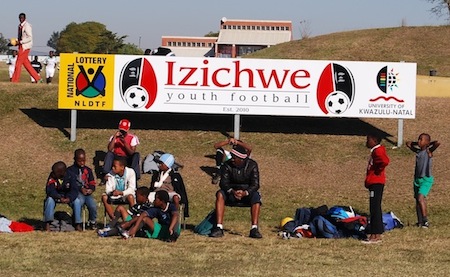
In the wake of Pitso Mosimane’s firing as Bafana Bafana head coach, there seems to be general agreement in South African football circles that a plan is needed to develop the local game constructively and sustainably.
On this blog, Mohlomi Maubane recently argued in favor of a German model that synchronizes the interests of the FA, the national team, and of professional clubs. “It is by virtue of young players being trained well that the German national team, and any other national team, can realise its full potential,” added Ted Dumitru and Sipho “King K” Kekana over at maximalfootball.com. “Lack of technical education in this vital aspect made many nations, including SA, compete without an identity and the results have been disastrous,” the two experts point out.
On June 9-10, 2012, the national finals of the under 15 boys’ Manchester United Premier Cup provided some clues about what lies ahead for South African football. At the Nike Football Training Centre in Klipspruit, Soweto, Ajax defeated SuperSport United in the final (2-1) to qualify for the global finals in China in July. The rest of the field featured Orlando Pirates, Izichwe FC, Bidvest Wits, School of Excellence, Diambars, and Mamelodi Sundowns.
According to observers’ accounts, most teams at the Premier Cup fielded sides of tall, strong boys indulging in well-rehearsed kick-and-rush football. Two exceptions stood out: Izichwe FC and School of Excellence. The case of Izichwe, an extraordinary program based at the University of KwaZulu-Natal in Pietermaritzburg, illustrates how making highly technical footballers out of promising teenagers requires not only financial resources and qualified coaches, but also time and patience.
Izichwe distinguishes itself in a number of ways from the vast majority of youth programs in South Africa and elsewhere on the continent. Founded in 2010, when my family had the privilege of being welcomed into the Izichwe clan, the academy got its name from the regiment (ibutho) of Shaka kaSenzangakhona, the founder of the Zulu kingdom. It operates on a shoestring budget compared to the PSL youth teams in the Premier Cup. It is a not-for-profit organization in which the parents and sponsors — both local and international — actively participate in shaping the sporting and educational development of each youngster.
After intense daily training sessions, the Izichwe boys, many of whom come from humble backgrounds, remain on the University of KwaZulu-Natal campus for a meal and to complete their homework before returning home for the night. Developing responsible citizens is considered just as important as training future members of Bafana Bafana. From a football standpoint, Thabo Dladla, Izichwe’s technical director, points out that while Izichwe coaches understand the importance of the team their priority is individual development. The coaching staff works assiduously to develop the technical, tactical, psychological, physical and emotional aspects of the boys’ game. Another important aspect of the Izichwe approach is the lack of an overbearing, ambitious owner, the kind of person who regularly exerts pressure on coaches and players to deliver trophies and obey the dictatorship of results.
For Bafana Bafana to improve, the quality of play in the Premier Soccer League — the richest league in Africa — must improve; but this cannot happen if football development programs fail to provide players under the age of 16 with the multiple skills required for successful professional careers. Izichwe shows the way forward. As we say in isiZulu: “Phambili!”.
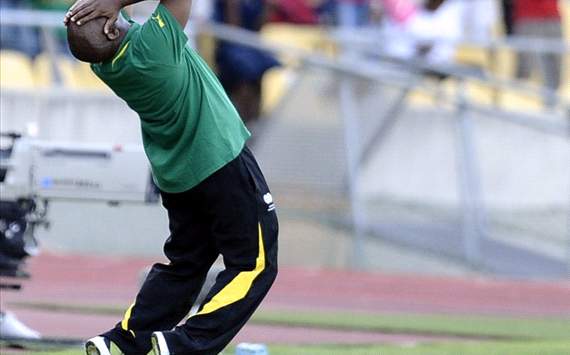
Guest post by Mohlomi Maubane
The Germans regularly find a way to excel in tournaments and are among the favourites to win the Euros in Poland/Ukraine. The South African football fraternity would do well to take a page out of the playbook that produced the current incarnation of Die Manschschaft when appointing a new Bafana Bafana coach. SAFA fired Pitso Mosimane this week after Bafana Bafana could only muster a 1-1 draw against Ethiopia in a 2014 World Cup qualifier in Rustenburg.
Eight years ago, the German national team was in dire straits after failing to win a single match in the group stages of the 2004 Euros. A rebirth seemed inevitable, and the newly appointed technical team of Jürgen Klinsmann and Joachim Löw pursued it with typical German precision.
Their first step was to give Die Manschschaft a new identity. The duo settled on a style based on playing the ball on the ground and transitioning swiftly from defence to attack. This was the outcome of an extensive consultation process. Workshops were held with German coaches and players to inquire how they wanted to play and how they wanted to be seen to be playing by their fans (and international ones too). Members of the German public also enjoyed the opportunity to provide input on how they wanted the national side to play.
From this inclusive process, Klinsmann and Löw drafted a curriculum for German football that was presented to the Bundesliga and the German FA. The latter then pressured teams in the former to build academy programmes that adhered to the overall strategy. Bundesliga teams were also encouraged to adopt a fitness programme that enabled the philosophy to be implemented. The newly appointed Under-21 coach also had to abide by the new policy.
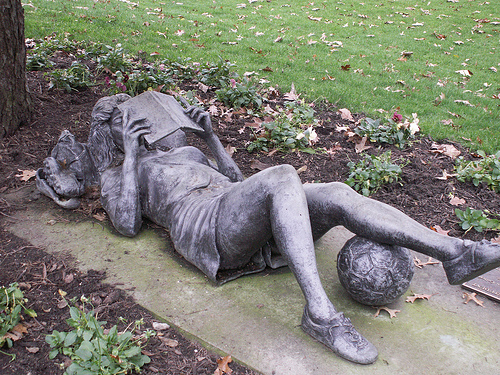 The Football Scholars Forum is an online academic book club based in the History Department at Michigan State University. (I’m one of the founders.) The production and sharing of knowledge and ideas in an open-access platform drives this international community.
The Football Scholars Forum is an online academic book club based in the History Department at Michigan State University. (I’m one of the founders.) The production and sharing of knowledge and ideas in an open-access platform drives this international community.
One of the Forum’s most valuable resources is a series of occasional posts by Andrew Guest entitled “A First Eleven” (not “The Best Eleven”). These brilliant posts provide an eclectic collection of links to and notes about work and events related to the beautiful game. Check out the summer 2012 installment here.
Previous “First Eleven” posts are here, here, and here.
The Italian Job: Revisited
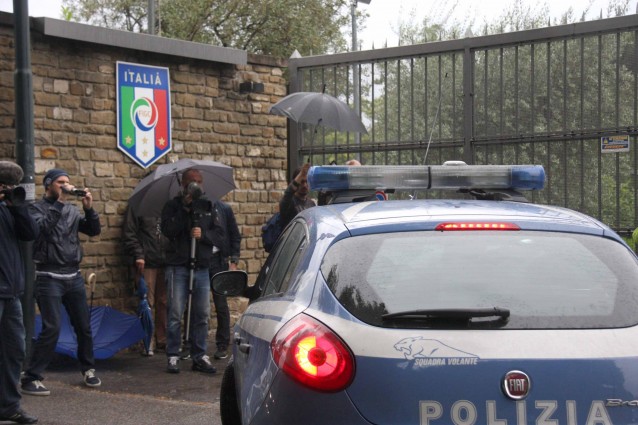
Police raid the Italian national team camp and an earthquake in Emilia-Romagna forces the cancellation of the Italy-Luxembourg Euro warm-up. It’s been a tough week for Italian tifosi, on and off the pitch.
Defender Domenico Criscito left the Euro squad after being implicated in the latest wave of prosecutorial investigations and charges. Meanwhile, Antonio Di Natale emerged as a pale as a ghost after riding out the 5.9 magnitude quake in an elevator.
The latest developments in calcio’s corruption and match fixing scandal have produced 19 arrests, including that of Lazio captain Stefano Mauri and ex-Genoa man Omar Milanetto. Prosecutors in Bari, Cremona, and Napoli have also implicated several dozen high profile players, managers, and club officials. That this mess is taking place only a few years after “calciopoli” — which famously landed Juve in serie B and penalized Milan, Lazio, and Fiorentina — is a potent indictment of the Italian football system and its willingness or ability to reform itself.
Italian authorities and prosecutors inspire confidence in some circles that the metastasizing problem will finally be addressed (read Declan Hill’s blog post here), but I find this optimistic view problematic on a number of levels. Here’s why:
First, the justice system in Italy is utterly dysfunctional. From civil to criminal cases, almost nothing works properly. The country has more than 10,000 laws on the books, that’s more than most, if not all, other countries in the world. Moreover, culprits of egregious crimes are often let off the hook with little more than a slap on the wrist while minor cases take years to resolve. And that’s just the tip of the iceberg.
Second, calcio works exactly like Italian politics. Family and “big man” cliques dominate and actively seek to expand their narrow interests against the common good. From serie A and B all the way to the lowest amateur ranks, this situation makes it almost impossible to develop a fair, equitable, and sustainable solution to the football rot.
Third, Italian sport and society struggle with a culture of cheating that pivots around what may be labeled “situational ethics” and a common sense rationalization that laws are made to be circumvented.
Given this dispiriting local situation and a worrisome rise in match fixing, corruption, and bribery on a global level, the Italian Prime Minister Mario Monti’s recent statement “that it would really benefit the maturity of us Italian citizens if this game was completely suspended” for a couple of years seems like a good idea. It might create the space needed for a soul-searching dialogue aimed at finding long-term solutions to calcio’s spiral of decline.
By Mohlomi Maubane
SOWETO, South Africa — “Why the f**k did he not do that at West Ham!!!” reads a YouTube comment in response to the video clip above featuring Benni McCarthy’s superb free kick in the 2011 Telkom Cup quarterfinal between Orlando Pirates and Moroka Swallows. This is the best goal I have seen in the PSL era: an extraordinary strike in a tense match Pirates were losing by a goal to nil. And while Swallows players were still scratching their heads in bewilderment, he got a second and sealed the match.
West Ham were the last European team McCarthy played for in a chequered 14-year European career whose highlight was a 2004 UEFA Champions League medal with FC Porto under Jose Mourinho. A sometimes controversial character who had endless run-ins with the South African Football Association, Benni set tongues wagging in the local football scene when he decided to return to South Africa. Some critics believed he was over the hill while others knew he still had something to offer. The man himself said he still had a lot of football in him, and with the right service, he would excel. At Orlando Pirates, he found the perfect setting to shine although he would have to do it without Dutch coach Ruud Krol who had just left after three years at the helm.
The Mighty Bucs boasted one of the best squads in the country and were brimming with confidence after winning a treble the previous season. Krol’s long term (at least in South African terms) afforded him the required time to build a team and mould plentiful talent in service of the collective. Team-play became paramount above all else, and prima donnas were booted out. The defense became mean. Opponents learned the hard way that beating Pirates meant playing to the final whistle. For example, in a November league game against Swallows. The Dube Birds looked set for a 1-0 victory, but as my friend Katiso Motaung wryly noted, Pirates managed to turn defense into attack and Jele equalized in the nanoseconds it took the referee to lift the whistle to his mouth to blow full time.
If Didier Drogba represents the image of a contemporary African hero on the global stage then who or what does Senegalese striker El Hadji Diouf represent?
Meet Digital Diouf. David Kilpatrick’s intriguing post in the New York Times GOAL blog tells us about “We Tripped El Hadji Diouf: The Story of a Photoshop Thread,” a recent exhibition at the Museum of the Moving Image in New York.
The story is about the intersection of sport, art, and digital technology. At the heart of it is a three-second clip of Diouf (at Rangers) sent flying by Hearts midfielder Ian Black’s tackle. The video was photoshopped and then posted on SomethingAwful.com, where users imaginatively molded it into extraordinarily creative and wide-ranging videos. Eventually, 35 of the videos were looped together and displayed at the Museum of the Moving Image.
“While many of the images embrace Diouf’s agony as some kind of karmic retribution for his villainy,” Kilpatrick writes, “others allow technology to revise the outcome and provide a happy ending.” Rumor has it that Dakar’s digital griots are planning a sequel.
Benni Leads Orlando Pirates to PSL Title
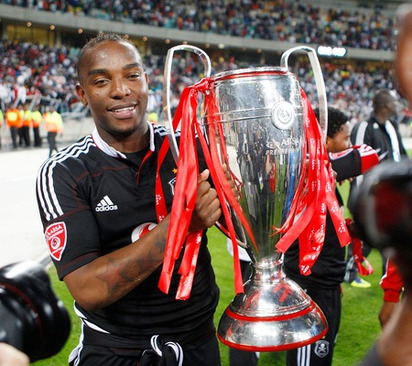 Benni McCarthy’s two second-half goals earned Orlando Pirates their second consecutive Premier Soccer League title. It was sweet revenge for McCarthy writes Rodney Reiners in the Cape Argus, “He’s been put down, trampled on, ridiculed, and dismissed as an over-weight, over-rated charlatan more often than any footballer should have to endure. Yet, each time, the 34-year-old Cape Town-born striker has come back to splatter copious bowls of beaten egg on the faces of his critics.”
Benni McCarthy’s two second-half goals earned Orlando Pirates their second consecutive Premier Soccer League title. It was sweet revenge for McCarthy writes Rodney Reiners in the Cape Argus, “He’s been put down, trampled on, ridiculed, and dismissed as an over-weight, over-rated charlatan more often than any footballer should have to endure. Yet, each time, the 34-year-old Cape Town-born striker has come back to splatter copious bowls of beaten egg on the faces of his critics.”
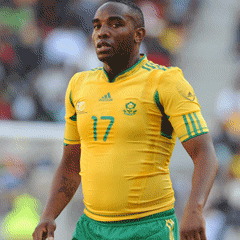 McCarthy — the most prolific scorer in Bafana Bafana’s history — has experienced a rebirth since the humiliation of being left off the 2010 World Cup squad for lack of fitness (see photo).
McCarthy — the most prolific scorer in Bafana Bafana’s history — has experienced a rebirth since the humiliation of being left off the 2010 World Cup squad for lack of fitness (see photo).
Pirates went into the tense closing Saturday with a two-point lead over Soweto rivals Moroka Swallows. Both contenders took care of business in their away matches in KwaZulu-Natal: Bucs beating Golden Arrows 4-2 at Durban’s monumental but seldom-used Moses Mabhida stadium (highlights here); The Birds winning 1-0 at Maritzburg United’s more humble and intimate Harry Gwala stadium.
Smiling broadly, Benni McCarthy told Ryan Cooper of Kick Off magazine: “I’m doing the thing I love most, and that is playing football. The haters out there . . . next year I’m gonna keep coming back with more!”